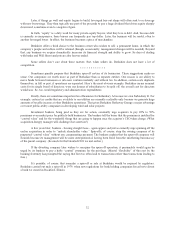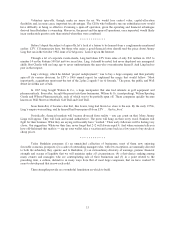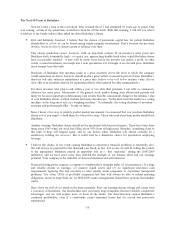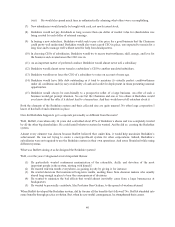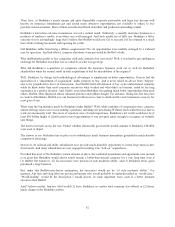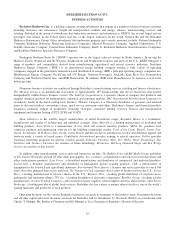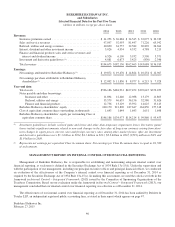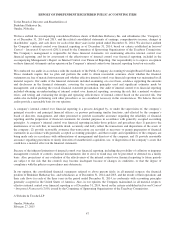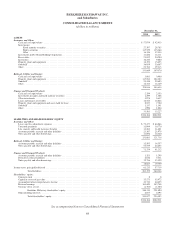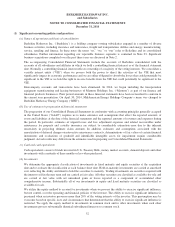Berkshire Hathaway 2014 Annual Report Download - page 44
Download and view the complete annual report
Please find page 44 of the 2014 Berkshire Hathaway annual report below. You can navigate through the pages in the report by either clicking on the pages listed below, or by using the keyword search tool below to find specific information within the annual report.Then, later, as Berkshire’s nearly unique and quite dependable corporate personality and large size became well
known, its insurance subsidiaries got and seized many attractive opportunities, not available to others, to buy
privately issued securities. Most of these securities had fixed maturities and produced outstanding results.
Berkshire’s marvelous outcome in insurance was not a natural result. Ordinarily, a casualty insurance business is a
producer of mediocre results, even when very well managed. And such results are of little use. Berkshire’s better
outcome was so astoundingly large that I believe that Buffett would now fail to recreate it if he returned to a small
base while retaining his smarts and regaining his youth.
Did Berkshire suffer from being a diffuse conglomerate? No, its opportunities were usefully enlarged by a widened
area for operation. And bad effects, common elsewhere, were prevented by Buffett’s skills.
Why did Berkshire prefer to buy companies with cash, instead of its own stock? Well, it was hard to get anything in
exchange for Berkshire stock that was as valuable as what was given up.
Why did Berkshire’s acquisition of companies outside the insurance business work out so well for Berkshire
shareholders when the normal result in such acquisitions is bad for shareholders of the acquirer?
Well, Berkshire, by design, had methodological advantages to supplement its better opportunities. It never had the
equivalent of a “department of acquisitions” under pressure to buy. And it never relied on advice from “helpers”
sure to be prejudiced in favor of transactions. And Buffett held self-delusion at bay as he underclaimed expertise
while he knew better than most corporate executives what worked and what didn’t in business, aided by his long
experience as a passive investor. And, finally, even when Berkshire was getting much better opportunities than most
others, Buffett often displayed almost inhuman patience and seldom bought. For instance, during his first ten years
in control of Berkshire, Buffett saw one business (textiles) move close to death and two new businesses come in, for
a net gain of one.
What were the big mistakes made by Berkshire under Buffett? Well, while mistakes of commission were common,
almost all huge errors were in not making a purchase, including not purchasing Walmart stock when that was sure to
work out enormously well. The errors of omission were of much importance. Berkshire’s net worth would now be at
least $50 billion higher if it had seized several opportunities it was not quite smart enough to recognize as virtually
sure things.
The next to last task on my list was: Predict whether abnormally good results would continue at Berkshire if Buffett
were soon to depart.
The answer is yes. Berkshire has in place in its subsidiaries much business momentum grounded in much durable
competitive advantage.
Moreover, its railroad and utility subsidiaries now provide much desirable opportunity to invest large sums in new
fixed assets. And many subsidiaries are now engaged in making wise “bolt-on” acquisitions.
Provided that most of the Berkshire system remains in place, the combined momentum and opportunity now present
is so great that Berkshire would almost surely remain a better-than-normal company for a very long time even if
(1) Buffett left tomorrow, (2) his successors were persons of only moderate ability, and (3) Berkshire never again
purchased a large business.
But, under this Buffett-soon-leaves assumption, his successors would not be “of only moderate ability.” For
instance, Ajit Jain and Greg Abel are proven performers who would probably be under-described as “world-class.”
“World-leading” would be the description I would choose. In some important ways, each is a better business
executive than Buffett.
And I believe neither Jain nor Abel would (1) leave Berkshire, no matter what someone else offered or (2) desire
much change in the Berkshire system.
42


